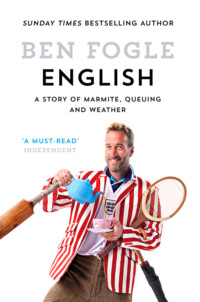
English: A Story of Marmite, Queuing and Weather
It is a loaded subject and a loaded book to write, full of pitfalls and taboo subjects that cause upset and irritation. It is why I occasionally feel I should never have written it. It is the reason I have agonized over it. It has given me sleepless nights.
Of course, it is easy to paint a national character with brushstrokes of stereotyping, and I will make no apology for my effort to explore many of these traits. After I had got beyond the stream of abuse from Scots, Welsh and Northern Irish occasioned by writing a book about Englishness, the character traits people suggested most often on social media were queuing, Marmite, umbrellas, the Queen, tea, fish and chips, Wimbledon, not complaining, bad teeth, dry humour, wax jackets, muddy Glastonbury, politeness, and the weather.
All of them iconically English, but it is the weather that has fascinated me the most. It is such a huge part of our national identity. It dominates our conversations. It is the subject of endless fascination and has, in my humble opinion, been the catalyst for so much of what makes England and the English what we are.
Again, if I’m honest I wanted to write a book about the weather. I wanted to explore our complex relationship with the weather – something we love to hate. The more I explored and researched, the more I became convinced that it is indeed the weather that has come to define us as a nation. Almost everything, every national trait and quirk and foible, can be attributed in some form to the weather. Okay, sometimes the link can be pretty tenuous, but it’s always there. So, often in this book, the chapters will explore a topic and our climate will be lurking in the background, lighting the subject with its changeable, unpredictable presence.
When I was a young boy, there was a song that we used to play over and over. It was one of my mother’s songs from the film Half a Sixpence, in which she starred alongside Tommy Steele. I can still remember every word:
If the rain’s got to fall, let it fall on Wednesday,
Tuesday, Monday, any day but Sunday
Sunday’s the day when it’s got to be fine,
’Cause that’s when I’m meeting my girl.
If the rain’s got to fall, let it fall on Maidstone,
Kingston, Oakstone, anywhere but Folkestone,
Folkestone’s the place where it’s got to be fine.
’Cause that’s where I’m meeting my girl.
What could be wetter or damper
Than to sit on a picnic hamper
Sippin’ a sasparella underneath a leaky umbrella?
If the rain’s got to fall, let it fall on Thursday,
Saturday, Friday, any day but my day.
Sunday’s the day when it’s got to be fine,
’Cause that’s when I’m meeting my girl.
The weather is a fundamental part of who we are. It has been estimated that weather-obsessed British people spend on average six months of their lives talking about whether it’s going to rain or shine, according to a survey published recently. Speculation about whether it’s going to be wet, complaints about the cold and murmurings about the heat are also the first points of conversation with strangers or colleagues for 58 per cent of Britons, the survey recorded. Another study found that Britons talk about the weather for about two days (forty-nine hours, to be exact) every year and the subject comes up more often than work, what is on television, sport or gossip.
Nineteen per cent of over-65s questioned also believe they can predict the weather as well as a professional weatherman. We are a nation whose starting and ending points are the weather.
The more I roamed England, the more I turned the nature of the book over in my head. Then one day, as I walked through the rain along Blackpool beach, I thought to myself, ‘That’s it. This is an honest portrait of my own experiences of Englishness over the years. The weather seeps into every corner of our English personality but the book is actually about understanding Englishness. It’s about Marmite, umbrellas, wonky teeth, sporting innovation and heroic failure. It’s about bad food and royalty and Hugh-Grant type characters. It’s as diverse as the nation itself.’
And what about the divide? Is there really such a thing as one Englishness? We might be a tiny island, but geographically and socially we are arguably one of the most diverse nations in the world. There is the obvious North/South divide, but there are more nuanced differences across the counties that make up England.
Shortly before I handed in my manuscript, my editor emailed me. ‘Do you think you could call it British?’ he asked. My heart sank, but it also gave me the resolve to lift my head and puff out my chest.
I am English (sort of) and I am proud of it, and this is my story of Living Englishly.
Конец ознакомительного фрагмента.
Текст предоставлен ООО «ЛитРес».
Прочитайте эту книгу целиком, купив полную легальную версию на ЛитРес.
Безопасно оплатить книгу можно банковской картой Visa, MasterCard, Maestro, со счета мобильного телефона, с платежного терминала, в салоне МТС или Связной, через PayPal, WebMoney, Яндекс.Деньги, QIWI Кошелек, бонусными картами или другим удобным Вам способом.
Вы ознакомились с фрагментом книги.
Для бесплатного чтения открыта только часть текста.
Приобретайте полный текст книги у нашего партнера:
Полная версия книги
